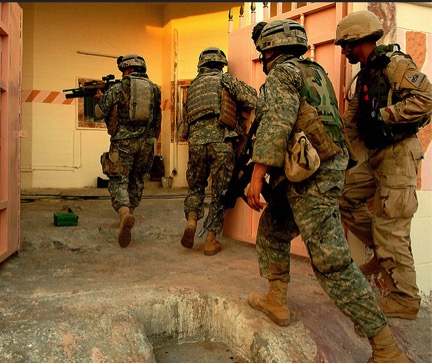| « Mumia Update | Greece Defies Washington: To Join Russia's Turkish Stream Pipeline Project » |
Dark Vision- Shia Militias and the Battle for Ramadi - Brian Downing

By Brian M Downing
ISIL’s seizure of the capital of Anbar province has once again called into question the effectiveness of the Iraqi army. With poor weather limiting air support, facing immense vehicle-borne explosives, Iraqi troops fled Ramadi as they did Mosul last summer. A counteroffensive is underway, spearheaded by Shia militias. Their effectiveness augurs well in the ISIL war in Iraq, though their impact on the fragile country worries Washington and other capitals – not always wrongly. (Image)
Effectiveness
Though discussions of the militias, and their relationship with Iran, have only recently come to the fore, the forces date back to the Iran-Iraq War of the eighties when Tehran organized guerrilla bands and political movements to weaken Saddam’s homefront. Washington’s surprise, then, should itself be a surprise.
When the US ousted the Sunnis in 2003, it unwittingly though predictably, boosted the importance of Iran-backed forces. Iran, fearing it was next in Washington’s trumpeted campaign of regime-change in the Middle East, directed the militias in an insurgency against US and coalition forces which raged for several years. For reasons neither Washington nor Tehran has deigned to articulate in public, Shia attacks on US troops and American threats against Iran both subsided simultaneously and quickly.
The Shia militia fighters have never demonstrated exceptional combat skills, not against the US, not against ISIL. Indeed, their battle tactics often border on the foolhardy – firing wildly while exposed to enemy fire, relying on ardor over caution. Their forte has always been tenacity in battle and knowledge of the urban terrain they operate in.
The regular Iraqi army is rent by the mixing of Sunnis, Shias, and Kurds – an awkward, problematic, but politically necessary policy of a fragmenting nation. This pretense of national unity makes for poor cohesion at the small-unit level – the foundation of effective fighting forces. Soldiers look around and do not see trustworthy fellow soldiers; they see sectarian and tribal rivals.
By contrast, Shia militias are, obviously enough, homogeneous in composition. Their sectarian identity as an oppressed minority contributes to better unit cohesion and to greater combat effectiveness. The cohesion is limited to individual militias and rivalries have flared into skirmishes in the recent past.
The battle of Ramadi
The number of ISIL fighters in and around Ramadi is uncertain, though the rout of the Iraqi army troops is not thought to have been accomplished by large numbers of fighters. Some 25000 Iraqi troops – roughly the number of ISIL forces in Syria and Iraq combined – are massing near Ramadi. Shia militias are expected to spearhead an imminent counterattack. They are said to be openly expressing their contempt for regular army troops.
ISIL, by virtue of its troops’ Salafi fervor which supersedes tribal and national parochialisms, enjoys remarkable cohesion and morale – probably more than any army of the region has shown in decades if not centuries. Further, in Ramadi, they will have the advantage of fighting from defensive positions in an urban environment, moving from building to building, firing from rubble pile to rubble pile, sniping from window to window.
However, ISIL troops in Ramadi are outnumbered, perhaps ten-to-one, and will face airstrikes from Iranian and American aircraft. In the absence of significant help from indigenous Sunnis, who are all too aware of Shia ethnic cleansing elsewhere, ISIL will, in the course of a lengthy costly battle, be outmaneuvered on the ground, pounded from the air, and worn down. Ramadi, like Kobane and Tikrit, will be another battle in what is becoming a long war of attrition.
Looking ahead
The rising importance of Shia militias poses questions for the country and the region as well. Washington and many Sunni capitals are alarmed that Iran will use its influence with the militias to establish control over Iraq. Iranian influence, as we have seen, has existed for over twelve years now, without leading to preponderance in Iraqi government – Shia-dominated though it is. Iraqis have demonstrated a preference for balancing between Tehran and Washington and they have the political support and oil revenue to see that the policy continues.
Further, Iran knows well that exerting control over Iraq will endanger an opening with the US, which is critical to the country’s economy and security. It could also spark a ruinous sectarian war in the Middle East and there would be little doubt which side Washington would favor.
More worrisome than the militias’ loyalty to Tehran is their future dispositions toward Baghdad and each other. Victory one day, will, in their estimation, elevate them from marginal auxiliaries to decisive vanguards, saviors of the nation, positioning them to ignore or even push aside Baghdad politicians who remained a-bed during the ISIL war. The numerous commanders may become antagonistic warlords with ambitions that do not sit well with the Baghdad government or with rival commanders either. Baghdad and other Iraqi cities, then, upon the defeat of ISIL one day, may resemble the cities of Libya.
Brian M Downing is a political-military analyst, and author of The Military Revolution and Political Change and The Paths of Glory: Social Change in America from the Great War to Vietnam. He can be reached at brianmdowning@gmail.com.
No feedback yet
FAIR USE NOTICE: This site contains copyrighted articles and information about environmental, political, human rights, economic, democratic, scientific, and social justice issues, etc. This news and information is displayed without profit for educational purposes, in accordance with, Title 17 U.S.C. Section 107 of the US Copyright Law. Thepeoplesvoice.org is a non-advocacy internet web site, edited by non-affiliated U.S. citizens. editor



